Juice-only diets can disrupt your gut microbiome by lowering fiber intake, which reduces beneficial bacteria like Lactobacillus and Bifidobacterium. This imbalance weakens your gut’s defenses, allowing harmful bacteria to grow. It also cuts down on short-chain fatty acids that support gut health, potentially leading to increased inflammation and weakened barrier function. To maintain a healthy microbiome during detoxes, incorporating fiber-rich foods and probiotics is essential—learn more about how to support your gut health effectively.
Key Takeaways
- Juice-only diets decrease fiber intake, reducing beneficial bacteria like Lactobacillus and Bifidobacterium.
- Limited fiber diminishes fermentation and SCFA production, impairing gut barrier integrity and immune function.
- Long-term juice diets can weaken microbiome resilience, leading to increased permeability and inflammation risks.
- Beneficial bacteria decline while pathogenic bacteria may proliferate, compromising gut health and defense mechanisms.
- Incorporating fiber-rich foods, probiotics, and fermented products helps support microbiome diversity during detoxes.
How Juice-Only Diets Affect Microbial Diversity
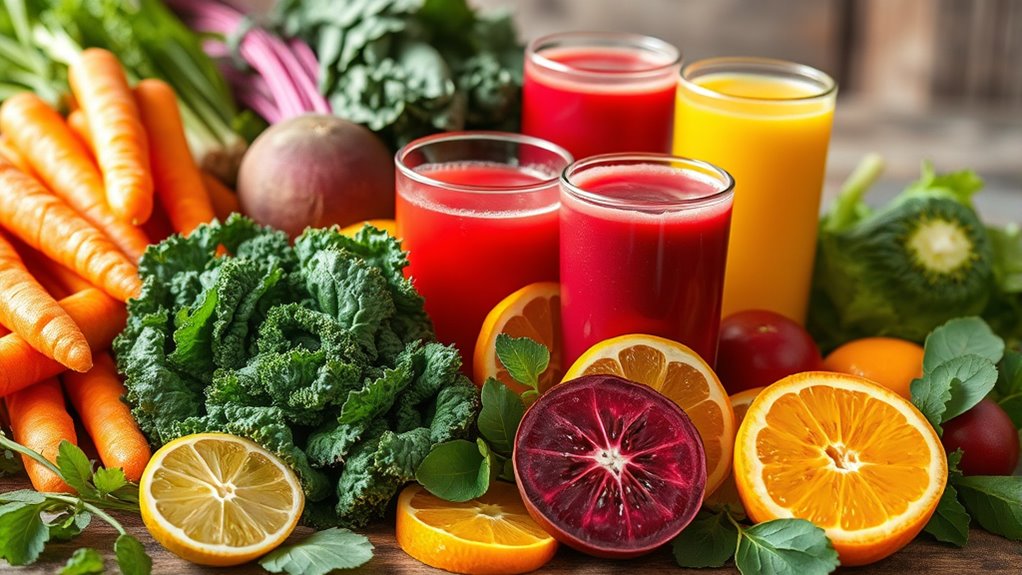
Juice-only diets can substantially impact your gut’s microbial diversity. When you switch to this diet, the fermentation balance in your gut shifts because you’re consuming mainly liquids with limited fiber. This change can reduce the variety of microbes that thrive on complex carbs, affecting microbial resilience—the ability of your gut microbiome to recover from stressors. As beneficial bacteria lose their preferred food sources, some may decline, while others adapt or diminish. This imbalance can weaken the overall stability of your microbiome, making it less resilient to future disturbances. Over time, these shifts could compromise your gut health, lowering your body’s ability to handle toxins and inflammation. Understanding how your diet influences microbial diversity is key to maintaining a resilient, balanced gut environment.
Changes in Beneficial Bacteria and Pathogens
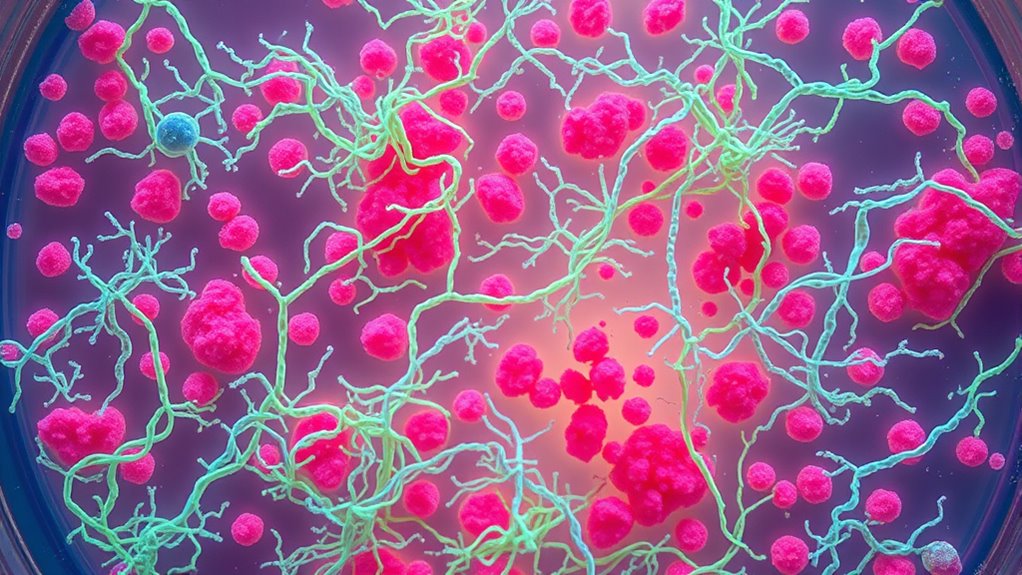
When you switch to a juice-only diet, the balance between beneficial bacteria and harmful pathogens in your gut can shift dramatically. Without sufficient dietary fiber, your beneficial bacteria, like Lactobacillus and Bifidobacterium, may decline, weakening your gut’s defenses. This reduction can allow harmful pathogens to proliferate, increasing your risk of infections and inflammation. To counteract these effects, probiotic supplementation can help replenish beneficial bacteria and restore balance. Additionally, incorporating fiber-rich juices supports the growth of good bacteria, promoting a healthier microbiome. While your diet lacks solid foods, actively managing your gut health through probiotics and fiber can prevent harmful pathogen overgrowth and maintain a more favorable microbial environment. Monitoring gut health is essential, especially when making significant dietary changes, as managing microbiome balance plays a crucial role in overall well-being. Incorporating gut health strategies can further support digestive harmony during such dietary shifts. Moreover, understanding beneficial bacteria decline can guide targeted interventions to sustain gut vitality. Recognizing how microbiome diversity influences health can also help tailor effective dietary and probiotic approaches.
Impact on Short-Chain Fatty Acid Production
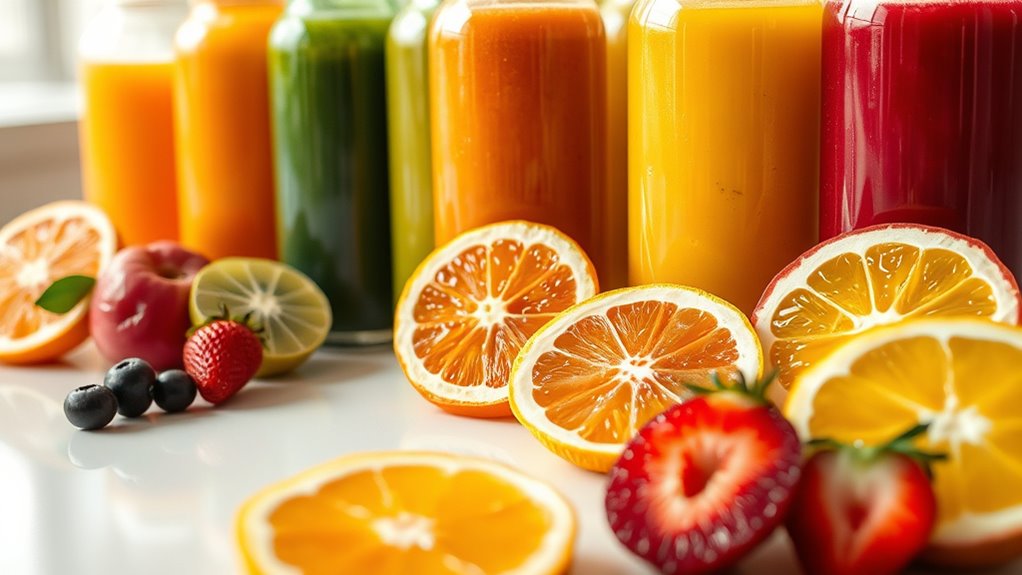
Since dietary fiber is essential for producing short-chain fatty acids (SCFAs), switching to a juice-only diet can substantially reduce their levels in your gut. Without enough fiber, prebiotic fermentation declines, leading to fewer SCFAs like acetate, propionate, and butyrate. This reduction impacts your gut’s ability to absorb these crucial compounds, affecting overall gut health. Additionally, understanding the different personality traits can help tailor dietary approaches that support gut health and lifestyle changes. Here are three key points:
- Reduced fiber intake limits prebiotic fermentation, decreasing SCFA production.
- Lower SCFA levels diminish their absorption, impairing energy supply and gut barrier support.
- Long-term decreases may negatively influence immune function and inflammation regulation.
A balanced diet that includes an adequate amount of dietary fiber is vital for maintaining optimal SCFA levels and overall gut health. In short, a juice-only diet can significantly hinder SCFA production and absorption, disrupting gut homeostasis. Moreover, choosing fiber-rich foods when transitioning back to a mixed diet can help restore SCFA levels more effectively.
Long-Term Effects on Gut Barrier Function
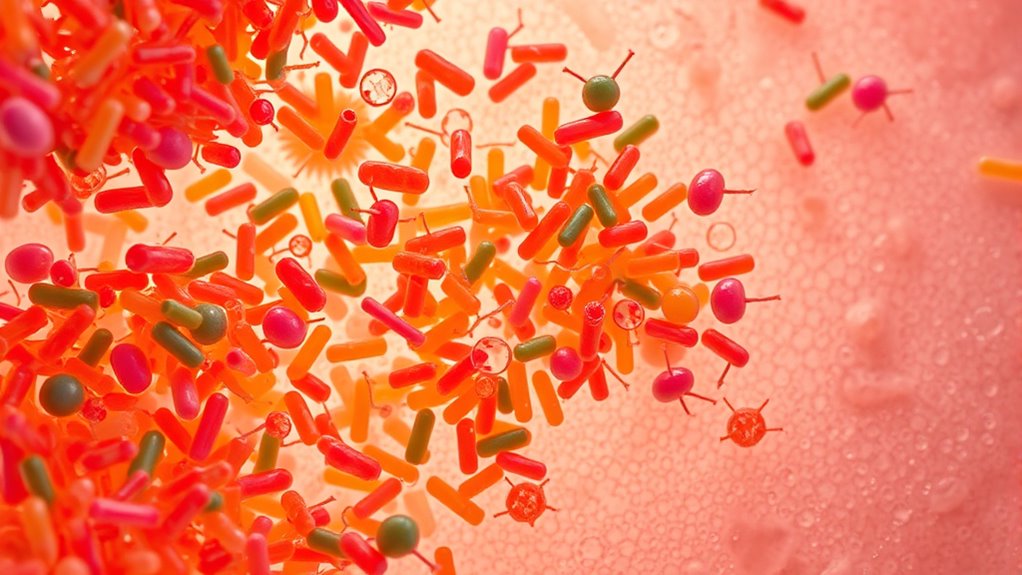
Extended adherence to a juice-only diet can weaken your gut barrier by reducing the production of essential compounds like short-chain fatty acids, which help maintain tight junction integrity. Without enough dietary fiber, your microbiome’s resilience diminishes, making your gut more susceptible to permeability issues. A lack of fiber limits the growth of beneficial bacteria that support barrier health, leading to potential inflammation and increased risk of infection. Over time, this compromised barrier can impair nutrient absorption and trigger immune responses. Incorporating prebiotics and probiotics into your diet can help support microbiome diversity and bolster gut barrier function. Maintaining a diverse, fiber-rich diet helps preserve microbiome resilience, ensuring your gut barrier remains strong. Juices alone often lack sufficient fiber, so long-term reliance on them may negatively impact gut barrier function and overall health.
Strategies to Support Microbiome Health During Detoxes
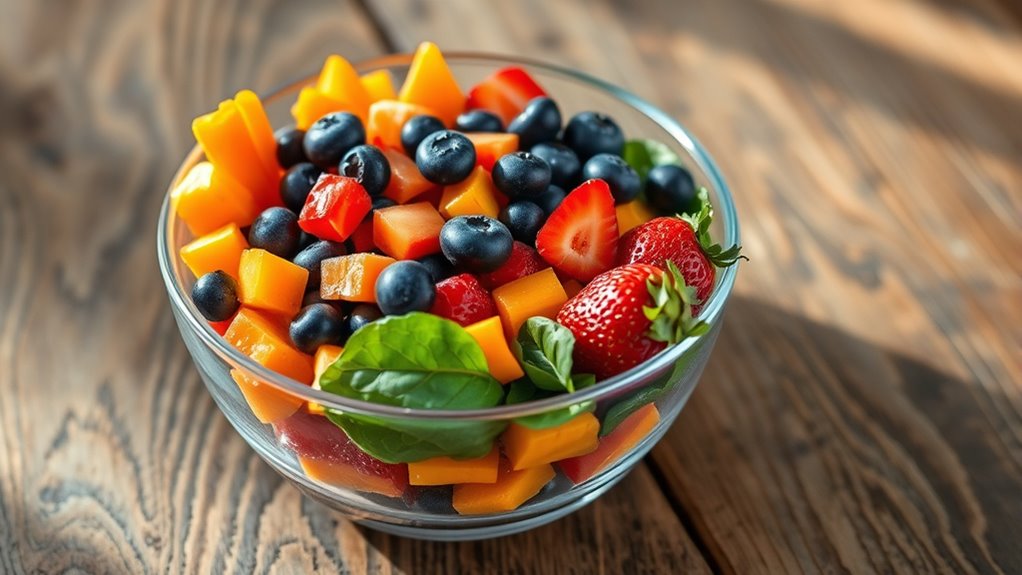
Keeping your microbiome healthy during detoxes requires intentional strategies, especially when following restrictive diets like juice-only plans that can weaken gut resilience. To support your gut, focus on these key steps:
- Incorporate probiotic supplementation to introduce beneficial bacteria that help maintain microbial balance and enhance digestion. Probiotic-rich foods can also be effective, but supplements ensure a consistent intake.
- Prioritize fiber intake from sources like fruits and vegetables to nourish your gut microbes and promote a diverse microbiome. Regular consumption of fiber-rich foods is essential for maintaining gut health.
- Consider adding fermented foods, such as sauerkraut or kefir, which naturally contain probiotics and support gut health.
- Incorporate electric bikes to support a healthy lifestyle and overall well-being, which can positively influence your microbiome. Regular physical activity like cycling has been shown to improve gut diversity and function. Additionally, engaging in consistent exercise can stimulate gut motility, further supporting microbiome health.
Frequently Asked Questions
Can Juice Diets Cause Nutrient Deficiencies Affecting Gut Health?
Juice diets can cause nutrient deficiencies, which might impact your gut health. When you lack essential vitamins, your immune system weakens, making your gut more prone to inflammation. Without enough fiber and nutrients, your gut bacteria may decline, leading to imbalances. These deficiencies can compromise digestion and overall gut function, so it’s important to make sure your diet is balanced and includes a variety of nutrient sources to support your gut health.
How Quickly Does the Gut Microbiome Recover After Stopping Juice-Only Diets?
When you stop a juice-only diet, your microbiome can start to recover relatively quickly, thanks to its resilience. Recovery timelines vary, but usually, within a few weeks, your gut bacteria begin to rebalance and regain diversity. Factors like diet variety, fiber intake, and overall health influence this process. Stay consistent with nutritious foods, and your microbiome will gradually restore its healthy diversity and function.
Are There Specific Juices That Better Support Microbiome Diversity?
When choosing juices to support microbiome diversity, you should focus on variety. Different juices, like beet, carrot, and berry, provide diverse nutrients and fibers that nourish your gut bacteria. The more you include a range of colorful, plant-based juices, the better your microbiome diversity. This variety helps maintain a balanced gut, promotes digestion, and boosts overall health. Remember, a colorful, diverse juice selection truly benefits your gut microbiome.
Does Juice Fasting Impact Gut Microbiota Differently in Different Age Groups?
Imagine your gut as a garden, thriving differently at each stage of life. Juice fasting impacts your microbiota like seasonal changes, with age-related microbiome variation shaping how your body adapts. Younger and older individuals experience distinct dietary adaptation differences, meaning the effects of juice fasting can vary. Your age influences how quickly and effectively your gut responds, highlighting the importance of personalized approaches to fasting based on your unique microbiome landscape.
What Are Signs of Negative Gut Changes During a Juice-Only Regimen?
During a juice-only diet, you might notice signs of negative gut changes like increased digestive discomfort, bloating, and gas. These symptoms often indicate your gut isn’t adjusting well to the lack of fiber and nutrients from solid foods. If you experience persistent or severe issues, it’s a sign to reconsider your diet, as these symptoms suggest your gut microbiome may be struggling to maintain balance and healthy function.
Conclusion
Think of your gut microbiome as a vibrant garden. When you switch to a juice-only diet, it’s like pulling out some plants—beneficial ones may dwindle, making room for weeds. To keep your garden thriving, support it with nourishing foods and probiotics. With care, your gut can bounce back, blooming with diverse, healthy bacteria. Remember, your gut is your inner landscape—tend it well, and it’ll flourish for years to come.
Aurelia is the Editor-in-Chief of The Graceful Kitchen, a vegan lifestyle blog that focuses on delicious, nutritious, and ethical eating. A lifelong vegan, Aurelia is passionate about sharing her love of plant-based cuisine with others. She is a regular contributor to several online and print publications, and has been interviewed by major news outlets about the benefits of a vegan diet. In her free time, Aurelia enjoys cooking, hiking, and spending time with her cats.










